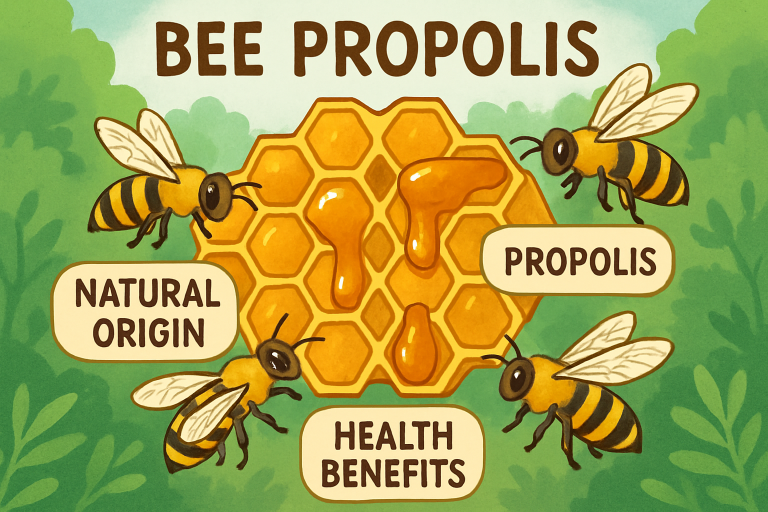Table of Contents
The Natural Origins of Bee Propolis
Bee propolis, or “bee glue,” is a natural substance made from beeswax, saliva, and plant resins. Used since ancient times by civilizations such as the Greeks, Romans, and Egyptians for healing and infection prevention, it remains valued for its protective properties. Inside the hive, propolis seals cracks, sterilizes the environment, and shields against bacteria, viruses, and stressors, while bees skillfully collect and process resins to create it. This unique composition is what gives propolis—particularly regional varieties, such as brazilian green propolis—its distinctive health-boosting characteristics.
Bee propolis is increasingly recognized for its wide-ranging health benefits. Once valued in ancient traditions, it is now celebrated in modern wellness for its support of cognitive and immune health. Rich in bioactive compounds, it represents a powerful link between natural remedies and scientific discovery.

Bee Propolis and Brain Function: What Science Reveals
Key Bioactive Compounds and Their Neurological Impact
Bee propolis is rich in flavonoids, phenolic acids, and esters, potent antioxidants that have captured the attention of neuroscientists. According to Healthline, these compounds play a crucial role in mitigating oxidative stress, a known contributor to cognitive decline and memory impairment. Evidence suggests their neuroprotective actions may contribute to maintaining mental sharpness and clarity as we age.
Recent Discoveries on Memory, Clarity, and Neural Protection
Modern research has begun to uncover the promising effects of propolis on brain health. Studies indicate that regular intake of propolis extract can support memory and processing speeds, protect neurons from damage, and promote synaptic plasticity—the brain’s ability to adapt and form new connections.
Shielding the Immune System: A Protective Natural Ally
Immune-Supportive Properties of Propolis
The immune-modulating activity of bee propolis is one of its standout features. Rich in compounds such as caffeic acid phenethyl ester (CAPE) and quercetin, propolis helps modulate immune system response by enhancing the action of white blood cells and curbing excessive inflammation. This delicate balance is crucial for robust immunity and faster recovery from everyday stressors.
The Role of Flavonoids and Phenolic Compounds
The synergy between flavonoids and phenolic compounds endows propolis with its broad-spectrum antimicrobial and anti-inflammatory properties. These elements contribute to fortifying the body against pathogens, making propolis especially beneficial during cold and flu season or periods of increased stress.
Bee Propolis in Modern Wellness Practices
With public interest in natural wellness on the rise, bee propolis has found a firm place in holistic health routines. People seeking alternatives to synthetic supplements are increasingly turning to propolis as part of daily regimens aimed at boosting overall resilience and clarity. As part of this growing trend, it’s worth noting that bees contribute far more than propolis, since their role in pollination is essential for global food security and ecosystems, as highlighted by Medical News Today.
Incorporation is easy and adaptable: propolis is commonly available in capsule form, as a tincture, in lozenges, or as a topical cream. Each form fits different preferences, from those who prefer adding drops to their tea to health enthusiasts who opt for daily capsules. Its mild, earthy taste also allows creative uses in smoothies and salad dressings, making it a seamless addition to most diets.
What To Consider Before Incorporating Bee Propolis
Consult Your Healthcare Provider
As with any dietary supplement, individual factors such as medications, existing health conditions, and unique sensitivities should be carefully evaluated. Always consult a healthcare provider before starting a new supplement, especially if you have known allergies to bee products or specific plants.
Allergies and Contraindications
Although generally well-tolerated, propolis can cause allergic reactions in individuals sensitive to bee stings, pollen, or specific resin-producing plants. Monitoring for mild reactions when first adding propolis to your wellness routine is prudent.
Conclusion: A Holistic Perspective on Bee Propolis
Bee propolis stands as a remarkable testament to nature’s ingenuity—supporting cognitive vitality and reinforcing immunity through a complex array of antioxidants and protective compounds. As research continues to emerge, staying informed about advancements allows you to make empowered decisions about your wellness journey. With mindful integration and quality sourcing, bee propolis can be a valuable addition to your toolkit for both mind and body health.
